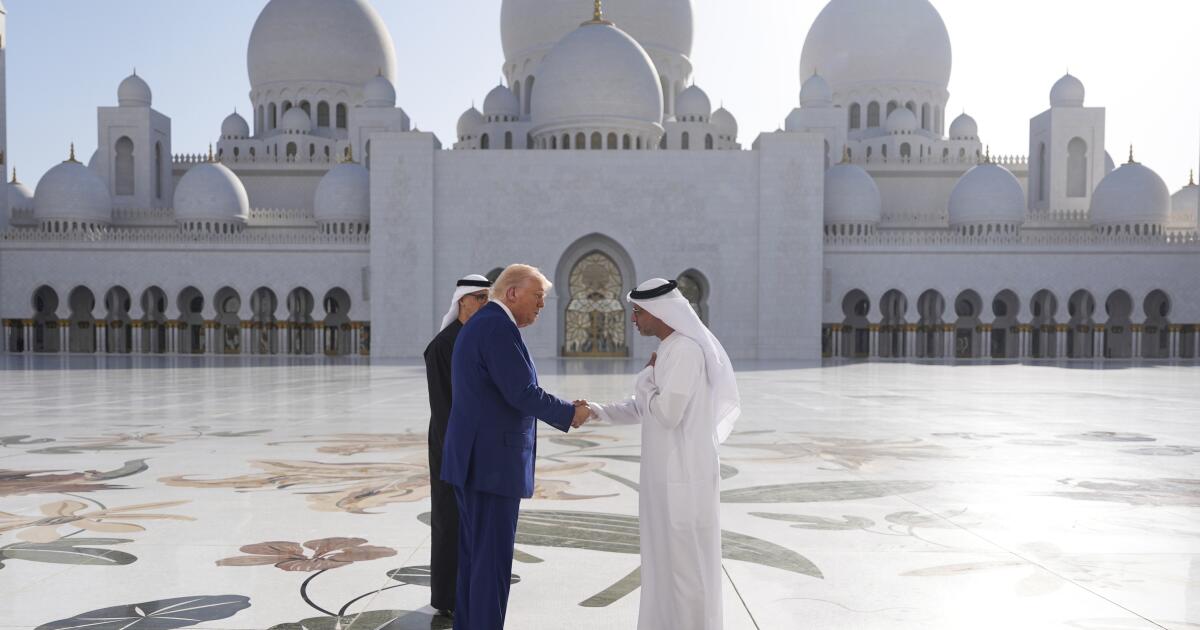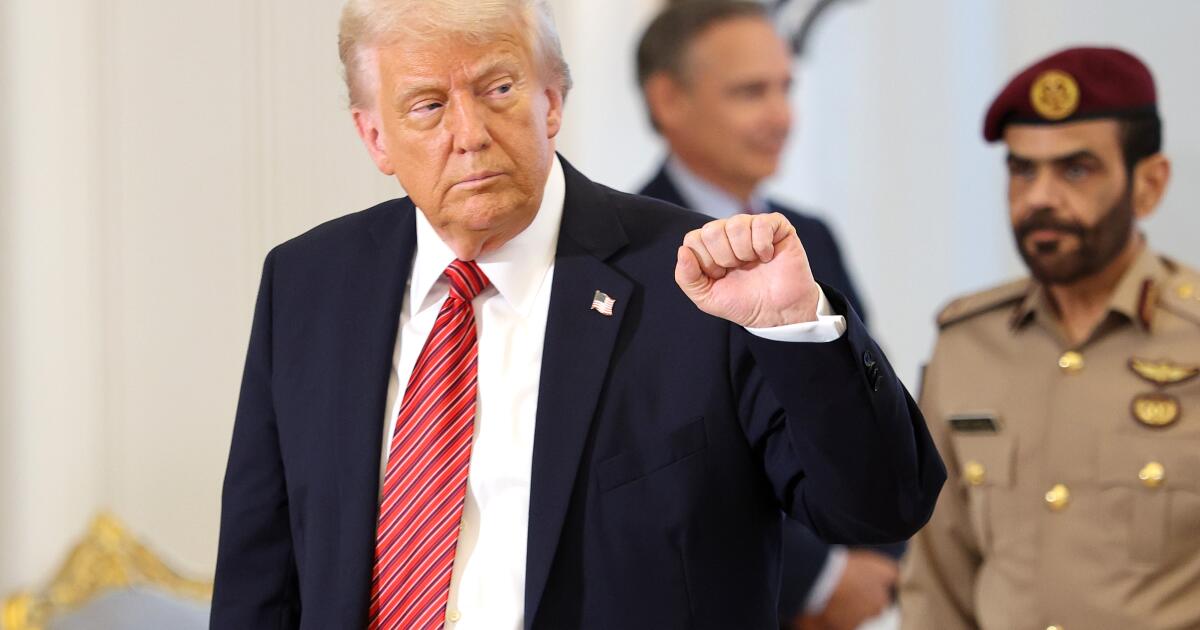Trump says U.S., Iran have ‘sort of’ agreed on nuclear deal terms
ABU DHABI, United Arab Emirates — President Trump said Thursday that the United States and Iran have “sort of” agreed to terms on a nuclear deal, offering a measure of confidence that an accord is coming into sharper focus.
Trump, in an exchange with reporters at a business roundtable in Doha, Qatar, described talks between American envoy Steve Witkoff and Iranian Foreign Minister Abbas Araghchi as “very serious negotiations” for long-term peace and said they were continuing to progress.
Still, throughout his four-day visit to the Gulf this week, the president has underscored that military action against Iran’s nuclear facilities remains a possibility if the talks derail.
“Iran has sort of agreed to the terms: They’re not going to make, I call it, in a friendly way, nuclear dust,” Trump said at the business event. “We’re not going to be making any nuclear dust in Iran.”
Without offering detail, he signaled growing alignment with the terms that he has been seeking.
A top political, military and nuclear advisor to Iran’s supreme leader, Ayatollah Ali Khamenei, told NBC News on Wednesday that Tehran stands ready to get rid of its stockpiles of highly enriched uranium that can be weaponized, agree to enrich uranium only to the lower levels needed for civilian use and allow international inspectors to supervise the process.
Ali Shamkhani added that in return, Iran wants an immediate lifting of all economic sanctions.
On Thursday, hours after Trump said the two sides were getting closer to a deal, Araghchi said Tehran’s ability to enrich uranium remained a core right of the Iranian people and a red line in nuclear talks.
“We have said repeatedly that defending Iran’s nuclear rights — including enrichment — is a fundamental principle,” the official said. “This is not something we concede, either in public discourse or in negotiations. It is a right that belongs to the Iranian people, and no one can take it away.”
Trump said his demands have been straightforward.
“They can’t have a nuclear weapon. That’s the only thing. It’s very simple,” Trump said. “It’s not like I have to give you 30 pages worth of details. It is only one sentence. They can’t have a nuclear weapon.”
But Trump on Wednesday suggested he was looking for Tehran to make other concessions as part of a potential agreement.
Iran “must stop sponsoring terror, halt its bloody proxy wars and permanently and verifiably cease pursuit of nuclear weapons,” Trump said in remarks at a meeting in Saudi Arabia, the first stop on the Mideast trip.
Before moving on to the United Arab Emirates from Qatar on Thursday, Trump stopped at a U.S. military installation at the center of American involvement in the Middle East and spoke to U.S. troops. The Republican president has used his visit to Gulf states to reject the “interventionalism” of America’s past in the region.
Al-Udeid Air Base was a major staging ground during the U.S. wars in Iraq and Afghanistan. The base houses some 8,000 U.S. troops, down from about 10,000 at the height of those wars.
Trump told the troops that his “priority is to end conflicts, not start them.”
“But I will never hesitate to wield American power if it’s necessary to defend the United States of America or our partners,” he said.
Trump has held up Gulf nations such as Saudi Arabia and Qatar as models for economic development in a region plagued by conflict. He urged Qatari officials to use their influence to entice Iran to come to terms with his administration on a nuclear deal.
Trump later flew to Abu Dhabi in the United Arab Emirates for the final leg of his trip. He visited the Sheikh Zayed Grand Mosque, the country’s largest mosque. The United Arab Emirates’ founder, Sheikh Zayed, is buried in the mosque’s main courtyard.
Trump took his shoes off, which is customary, as he stepped into the house of worship and spent time marveling at the architecture.
“It’s beautiful,” Trump said.
He later attended a state visit hosted by United Arab Emirates President Mohammed bin Zayed Al Nahyan at the Qasr Al Watan presidential palace. Trump and his delegation were greeted by children wearing traditional robes and waving small U.S. and United Arab Emirates flags, and they were guided through a space exhibit inside the palace.
Al Nahyan also presented Trump with the Order of Zayed, the United Arab Emirates’ highest civil decoration and credited Trump with building the two nations’ economic partnership to new heights.
“This partnership has taken a significant leap forward since you assumed office,” he told Trump.
As he made his way to Abu Dhabi on Thursday, Trump reminded reporters about President Biden’s 2022 fist bump with Saudi Crown Prince Mohammed bin Salman, a moment roundly criticized by human rights activists already upset by the Democrat’s decision to hold the meeting. Trump noted in contrast that while in Saudi Arabia and Qatar this week, he had shaken many hands.
“They were starving for love because our country didn’t give them love,” Trump told reporters aboard Air Force One. “They gave him a fist bump. Remember the fist bump in Saudi Arabia? He travels all the way to Saudi Arabia … and he gives him a fist bump. That’s not what they want. They don’t want a fist bump. They want to shake his hand.”
Miller and Madhani write for the Associated Press. Madhani reported from Dubai. AP writers Amir Vahdat in Tehran and Gabe Levin in Dubai contributed to this report.

